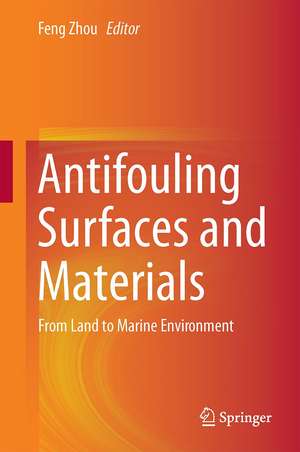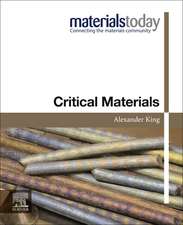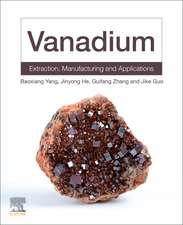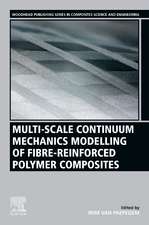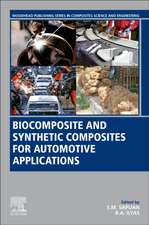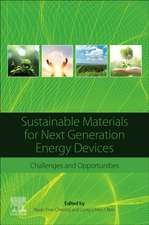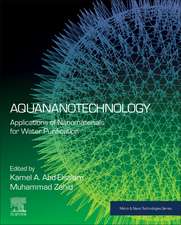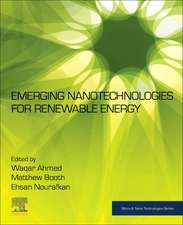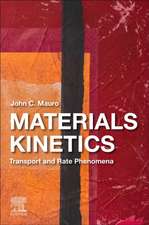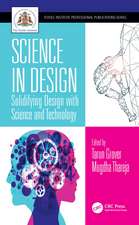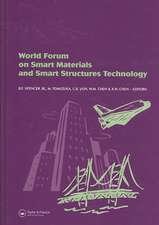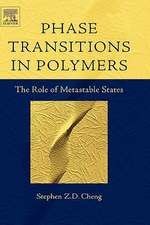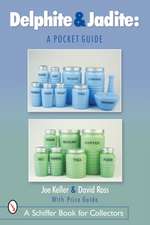Antifouling Surfaces and Materials: From Land to Marine Environment
Editat de Feng Zhouen Limba Engleză Hardback – 28 noi 2014
Feng Zhou is a professor at the State Key Laboratory of Solid Lubrication, Lanzhou Institute of Chemical Physics, Chinese Academy of Sciences.
| Toate formatele și edițiile | Preț | Express |
|---|---|---|
| Paperback (1) | 381.98 lei 43-57 zile | |
| Springer Berlin, Heidelberg – 23 aug 2016 | 381.98 lei 43-57 zile | |
| Hardback (1) | 389.11 lei 43-57 zile | |
| Springer Berlin, Heidelberg – 28 noi 2014 | 389.11 lei 43-57 zile |
Preț: 389.11 lei
Nou
Puncte Express: 584
Preț estimativ în valută:
74.48€ • 80.93$ • 62.60£
74.48€ • 80.93$ • 62.60£
Carte tipărită la comandă
Livrare economică 21 aprilie-05 mai
Preluare comenzi: 021 569.72.76
Specificații
ISBN-13: 9783662452035
ISBN-10: 3662452030
Pagini: 175
Ilustrații: IX, 175 p. 95 illus., 50 illus. in color.
Dimensiuni: 155 x 235 x 15 mm
Greutate: 0.44 kg
Ediția:2015
Editura: Springer Berlin, Heidelberg
Colecția Springer
Locul publicării:Berlin, Heidelberg, Germany
ISBN-10: 3662452030
Pagini: 175
Ilustrații: IX, 175 p. 95 illus., 50 illus. in color.
Dimensiuni: 155 x 235 x 15 mm
Greutate: 0.44 kg
Ediția:2015
Editura: Springer Berlin, Heidelberg
Colecția Springer
Locul publicării:Berlin, Heidelberg, Germany
Public țintă
ResearchCuprins
Antifouling Self-Cleaning Surface.- Antifouling Surfaces of Self-assembled Thin Layer.- Anti-fouling Surfaces Based on Polymer Brushes.- Antifouling of Micro/nano Structural Surfaces.- Antifouling Based on Biocides: from Toxic to Green.- Development of Marine Antifouling Coatings.- Effect of Boundary Slippage on Foul Release.
Notă biografică
Dr. Feng Zhou is a full Professor at Lanzhou Institute of Chemical Physics, Chinese Academy of Sciences and the Deputy Director of State Key Laboratory of Solid Lubrication. He received his PhD in 2004 and subsequently spent three years (2005-2008) at the Department of Chemistry, University of Cambridge as a Research Associate. He has published more than 200 journal papers with more than 6000 citations and his current H-index is 44. His research interests include the surfaces/interfaces of soft matters, drag-reduction and anti biofouling, as well as biolubrication. He has received a number of awards including Young Scholar Award in Tribology from Chinese Engineering Institute (2009), Distinguished Young Scholars from National Science Foundation of China (2011); Outstanding Young Chemist Prize of Chinese Chemical Society (2011) and Outstanding Youth Award from International Society of Bionic Engineering (2013).
Textul de pe ultima copertă
This book reviews the development of antifouling surfaces and materials for both land and marine environments, with an emphasis on marine antibiofouling. It explains the differences and intrinsic relationship between antifouling in land and marine environments, which are based on superhydrophobicity and superhydrophilicity respectively. It covers various topics including biomimetic antifouling and self-cleaning surfaces, grafted polymer brushes and micro/nanostructure surfaces with antifouling properties, as well as marine antibiofouling. Marine antibiofouling includes both historical biocidal compounds (tributyltin, copper and zinc) and current green, non-toxic antifouling strategies. This book is intended for those readers who are interested in grasping the fundamentals and applications of antifouling.
Feng Zhou is a professor at the State Key Laboratory of Solid Lubrication, Lanzhou Institute of Chemical Physics, Chinese Academy of Sciences.
Feng Zhou is a professor at the State Key Laboratory of Solid Lubrication, Lanzhou Institute of Chemical Physics, Chinese Academy of Sciences.
Caracteristici
Explains the differences and intrinsic relationship between antifouling in land and marine environments Especially focuses on marine anti biofouling, including both anti biofouling biocides and green, non-toxic antifouling strategies Introduces biomimetic antifouling and self-cleaning surfaces, grafted polymer brushes and micro/nanostructure surfaces with antifouling properties Includes supplementary material: sn.pub/extras
